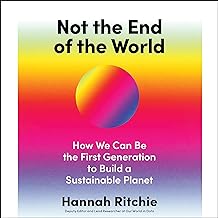Book Review — Not the End of the World
There’s no shortage of books, essays and documentaries warning that climate change will make Planet Earth uninhabitable. Therefore, Hannah Ritchie’s Not the End of the World provides a refreshing reminder of how much is going right and likely ways we’ll adapt to a warmer planet.
Ritchie is no climate denier. She studied environmental science at the University of Edinburgh. Like many young people, she initially believed everything was getting worse. Two thirds of Americans aged 16-25 and 72% of Brits responding to a survey agreed that, “The future is frightening.”
Hannah Ritchie eschewed the mindless anti-fossil fuel protests of many contemporaries. Instead, she studied the issues and then wrote a book sharing her generally positive conclusions about our environment while highlighting how much more needs to be done.
Human activity has never been environmentally sustainable. The problems didn’t begin with burning coal for the industrial revolution in the middle of the 19th century. Over thousands of years our ancestors hunted many large animals to extinction, polluted the air by burning wood and cut down huge amounts of forest.
Frustratingly for the 36% of Americans 16-25 (and 38% of Britons) who are hesitant to have children, there has objectively never been a better time to be alive. Globally, child mortality, maternal mortality and life expectancy are all the best they’ve ever been. Hunger and extreme poverty are lower than ever, while access to clean water and education are higher than ever. Just because it’s a great time to be a human doesn’t mean we can’t improve on all these metrics and others.
Negativity is all too common. A recent FT-Michigan Ross poll found that three quarters of respondents described US economic conditions as “negative”. More people describe their own financial situation as “surviving” versus “thriving”. This is with US GDP growing at 3.3% and unemployment at 3.7%.
Social scientists can ponder why surveys seem increasingly detached from the data. Hannah Ritchie is here to drag us out of the gloom.
Many of us are breathing the cleanest air in centuries. 1950s London surrounded by coal-burning power plants and factories had dirtier air than today’s New Delhi. Ritchie makes the obvious point, that ‘Once life is comfortable, our concerns turn to the environment around us.” Reducing CO2 emissions sits near the top of Maslow’s Hierarchy of Needs for most people, which is why emerging Asia still burns so much coal.
London responded to the Great Smog of 1952 with pollution controls. By 2008 living standards were high enough in Beijing that they responded similarly – albeit in a typically Chinese way. Many households had their coal boilers removed before gas replacements were available, enduring a cold winter without heat.
Palm oil cultivation is often criticized as environmentally unsustainable. But one hectare produces 2.8 metric tonnes of oil, compared with 0.3 tonnes of olive oil or 0.26 tonnes of coconut oil. If we used less palm oil, we’d need much more farmland to produce other types of oil.
Ritchie walks through her changing appreciation for the impact of natural disasters. Like almost half of survey respondents, she once thought deaths had more than doubled over the past century. They’ve fallen by 97%, adjusted for population. This is like the point Alex Epstein makes, crediting fossil fuels for providing us with more robust infrastructure and the technology to receive earlier warnings. Fossil fuels have made life immeasurably better. But Ritchie remains firmly convinced we need to reduce emissions. By contrast, Epstein thinks a richer world a couple of generations from now will be better equipped and more motivated to tackle the issue.
Like most who think hard about climate change, Ritchie is a big fan of nuclear power. She believes we need to phase out all fossil fuels eventually but wants to start with coal. She doesn’t think we’ll hit the UN’s target of eliminating greenhouse gas emissions by 2050 but is optimistic that we’re on a good path. In acknowledging the many improvements in quality of life, she wouldn’t regress by limiting energy consumption.
Not the End of the World offers an engaging and optimistic worldview. Bill Gates found it, “A surprising (and surprisingly optimistic) book on climate change.” He called it, “an essential antidote to environmental doomsday-ism.”
This is true. Too many climate extremists are among those hesitant to have children or unable to see the positives in today’s strong US economy. The world is doing fine, can do better in many ways and will get through climate change.
Hannah Ritchie explains why.
We have three have funds that seek to profit from this environment:
